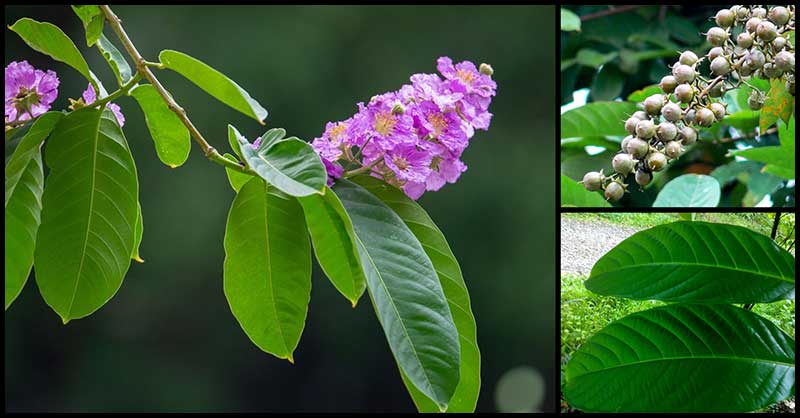Banaba is a large, flowering tree that is native to the India and Philippines. It is also known as Queen’s Crape-myrtle, Giant Crape-myrtle, or Pride of India. This natural treatment to a number of health issues has large panicles of its attractive lavender or pink flowers, which bloom from June to July.
Banaba and Blood Sugar Levels
Taking Banaba may help lower our chances of developing diabetes. It has been used as a folk medicine to treat diabetes in various parts of the world, primarily Southeast Asia. It is used to help lower blood sugar, help the body use insulin more efficiently, and reduces the risk of type 2 diabetes. Its antidiabetic effect is attributed to its beneficial components namely corosolic acid, ellagitannins, and gallotannins (1).
Corosolic acid, the main phytochemical in Banaba, has anti-inflammatory properties and works by increasing insulin sensitivity, enhancing glucose uptake, and inhibiting alpha-glucosidase — an enzyme that helps digest carbs. These effects help lowers blood sugar levels (1).
In a study, experts found that ingesting Banaba’s compound corosolic acid can lower blood sugar levels 90 minutes later (2).
The hypoglycemic effects of Banaba have been attributed to both corosolic acid as well as ellagitannins. Corosolic acid has been reported to decrease blood sugar levels within 60 min in human subjects. In addition to this, it also exhibits antihyperlipidemic and antioxidant activities. A growing body of evidence involving animal and human studies as well as in vitro systems indicates that Banaba leaf extracts exert anti-diabetic and anti-obesity effects (3).
Banaba leaves can be used as a tea to control blood sugar levels and manage diabetes.
Banaba tea is a great beverage choice. Have 2 teaspoons of dried Banaba leaves to a tea infuser. Bring 2 cups of water to a boil and pour over leaves. Let steep for 3-4 minutes before straining. Add 1 teaspoon each of honey and lemon and serve.
We can also have a refreshingly iced tea version of the same enhanced with calamansi and lemongrass. Either refrigerate the tea or add ice cubes to the tea.
What are the other benefits that we can obtain from Banaba?
- May reduce heart disease risk factors
- Antioxidant activities
- May offer anti-obesity benefits
- May have protection against kidney damage
Sources:
- https://www.healthline.com/nutrition/banaba-leaf#benefits
- https://linkinghub.elsevier.com/retrieve/pii/S0168822706000349
- https://www.ncbi.nlm.nih.gov/pmc/articles/PMC3468018/
Disclaimer
The watching, interacting, and participation of any kind with anything on this page does not constitute or initiate a doctor-patient relationship with Dr. Farrah®. None of the statements here have been evaluated by the Food and Drug Administration (FDA). The products of Dr. Farrah® are not intended to diagnose, treat, cure, or prevent any disease. The information being provided should only be considered for education and entertainment purposes only. If you feel that anything you see or hear may be of value to you on this page or on any other medium of any kind associated with, showing or quoting anything relating to Dr. Farrah® in any way at any time, you are encouraged to and agree to consult with a licensed healthcare professional in your area to discuss it. If you feel that you’re having a healthcare emergency, seek medical attention immediately. The views expressed here are simply either the views and opinions of Dr. Farrah® or others appearing and are protected under the first amendment.
Dr. Farrah® is a highly experienced Licensed Medical Doctor certified in evidence-based clinical nutrition, not some enthusiast, formulator, or medium promoting the wild and unrestrained use of nutrition products for health issues without clinical experience and scientific evidence of therapeutic benefit. Dr. Farrah® has personally and keenly studied everything she recommends, and more importantly, she’s closely observed the reactions and results in a clinical setting countless times over the course of her career involving the treatment of over 150,000 patients.
Dr. Farrah® promotes evidence-based natural approaches to health, which means integrating her individual scientific and clinical expertise with the best available external clinical evidence from systematic research. By individual clinical expertise, I refer to the proficiency and judgment that individual clinicians acquire through clinical experience and clinical practice.
Dr. Farrah® does not make any representation or warranties with respect to the accuracy, applicability, fitness, or completeness of any multimedia content provided. Dr. Farrah® does not warrant the performance, effectiveness, or applicability of any sites listed, linked, or referenced to, in, or by any multimedia content.
To be clear, the multimedia content is not intended to be a substitute for professional medical advice, diagnosis, or treatment. Always seek the advice of your physician or other qualified health provider with any questions you may have regarding a medical condition. Never disregard professional medical advice or delay in seeking it because of something you have read or seen in any website, video, image or media of any kind.
Dr. Farrah® hereby disclaims any and all liability to any party for any direct, indirect, implied, punitive, special, incidental, or other consequential damages arising directly or indirectly from any use of the content, which is provided as is, and without warranties.









